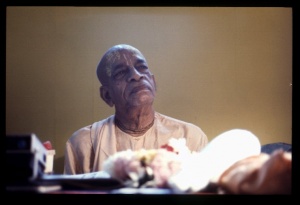SB 3.7.2

A.C. Bhaktivedanta Swami Prabhupada
TEXT 2
- vidura uvāca
- brahman kathaṁ bhagavataś
- cin-mātrasyāvikāriṇaḥ
- līlayā cāpi yujyeran
- nirguṇasya guṇāḥ kriyāḥ
SYNONYMS
viduraḥ uvāca — Vidura said; brahman — O brāhmaṇa; katham — how; bhagavataḥ — of the Personality of Godhead; cit-mātrasya — of the complete spiritual whole; avikāriṇaḥ — of the unchangeable; līlayā — by His pastime; ca — either; api — even though it is so; yujyeran — take place; nirguṇasya — who is without the modes of nature; guṇāḥ — modes of nature; kriyāḥ — activities.
TRANSLATION
Śrī Vidura said: O great brāhmaṇa, since the Supreme Personality of Godhead is the complete spiritual whole and is unchangeable, how is He connected with the material modes of nature and their activities? If this is His pastime, how do the activities of the unchangeable take place and exhibit qualities without the modes of nature?
PURPORT
As described in the previous chapter, the difference between the Supersoul, the Supreme Lord, and the living entities is that the activities of the Lord in creating the cosmic manifestation are performed by the Lord through the agency of His multifarious energies, but this manifestation is bewildering to the living entities. The Lord is therefore the master of the energies, whereas the living entities are subjugated by them. By asking various questions about transcendental activities, Vidura is clearing the misconception that when the Lord either descends on the earth in His incarnation or appears Himself with all His potencies, He too is subjected to the influence of māyā, just like an ordinary living entity. This is generally the calculation of less intelligent philosophers who consider the position of the Lord and that of the living entities to be on the same level. Vidura is hearing the great sage Maitreya refute these arguments. The Lord is described in this verse as cin-mātra, or completely spiritual. The Personality of Godhead has unlimited potencies to create and manifest many wonderful things, both temporary and permanent. Because this material world is the creation of His external energy, it thus appears to be temporary; it is manifested at certain intervals, maintained for some time, and again dissolved and conserved in His own energy. As described in Bhagavad-gītā (BG 8.19), bhūtvā bhūtvā pralīyate. But the creation of His internal potency, the spiritual world, is not a temporary manifestation like the material world, but is eternal and full of transcendental knowledge, opulence, energy, strength, beauties and glories. Such manifestations of the Lord's potencies are eternal and are therefore called nirguṇa, or free from all tinges of the modes of material nature, even up to the mode of material goodness. The spiritual world is transcendental even to material goodness and thus is unchangeable. Since the Supreme Lord of such eternal and unchangeable qualities is never subjugated by anything like material influence, how can His activities and form be conceived to be under the influence of illusory māyā, as is the case with the living entities?
A juggler or magician displays many wonders with his acts and arts. He can become a cow by his magical tactics, and yet he is not that cow; but at the same time, the cow displayed by the magician is not different from him. Similarly, the material potency is not different from the Lord because it is an emanation from Him, but at the same time, that manifestation of potency is not the Supreme Lord. The Lord's transcendental knowledge and potency always remain the same; they do not change, even when displayed in the material world. As stated in Bhagavad-gītā, the Lord descends on the earth by His own internal potency, and therefore there is no question of His becoming materially contaminated, changed or otherwise affected by the modes of material nature. The Lord is saguṇa by His own internal potency, but at the same time He is nirguṇa, since He is not in touch with the material energy. The restrictions of the prison house are applicable to prisoners who are condemned by the king's law, but the king is never affected by such implications, although he may visit the prison house out of his good will. In the Viṣṇu Purāṇa the six opulences of the Lord are stated to be nondifferent from Him. The opulences of transcendental knowledge, strength, opulence, potency, beauty and renunciation are all identical with the Personality of Godhead. When He personally displays such opulences in the material world, they have no connection with the modes of material nature. The very word cin-mātratva is the guarantee that the Lord's activities are always transcendental, even when displayed in the material world. His activities are as good as the Supreme Personality Himself, otherwise liberated devotees like Śukadeva Gosvāmī would not have been attracted by them. Vidura inquired how the Lord's activities can be in the modes of material nature, as is sometimes miscalculated by persons with a poor fund of knowledge. The inebriety of the material qualities is due to the difference between the material body and the spirit soul. The conditioned soul's activities are displayed through the medium of the modes of material nature and are therefore perverted in appearance. However, the Lord's body and the Lord Himself are one and the same, and when the Lord's activities are displayed, they are certainly nondifferent from the Lord in all respects. The conclusion is that persons who consider the Lord's activities material are certainly mistaken.